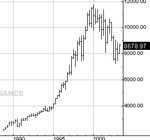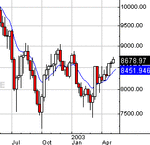Mr Charts,
I am a trend follower and a long term trader (like the turtles although I have my own methodology).
You should compare apples with apples. If you are looking at an annual chart, entry and exit are based on the same data.
Had anyone used turtle principles to get on board the dow using the chart you put there, plenty of money would have been made. Using the turtle rules on the chart you supplied, one would have entered around 1994 and exited around 2001. Not a bad trade really - picked up most of the boom - even though I don't know anyone who trades using end of year data ;-)
In my opinion, the markets haven't changed. They are simply more volatile. Long term trend followers like me use the volatility as part of our trading methodology.
There have there been huge trends in the DOW, SP, Nasdaq, Dax, FTSE, Cocoa, AUD, USD, EUR, GBP, Gold, Oil etc as well as in plenty of stocks over the last few years. We took advantage of many of them and continue to do so.
A good trend following system will keep you in the good trades and get you out of the poor trades.
Whilst I do not believe that markets have changed, I do support the theory that expectations of the average player certainly has. It is no longer enough to aim for the 30% pa returns like professionals, most punters are looking to make a full time living trading 20K in capital. A situation that more often than not ends in tears ;-( and leads to questions of where is the holy grail?
I trade with EOD data and have done for many years. Every one of my trading years have been profitable (some more than others) using a long term trend following technique. Most don't have the patience to trade this way but if sleeping well and making steady profits appeals then longer term trend following has lost none of it's overall profitability.
I actually wrote a book on the subject of trend following and trading methodology for some clients (I am a licensed financial adviser) recently to help them understand the principles and why it is still a valid trading methodology. Not trying to convert anyone but for those who want to pursue long term trend following, I believe you are on the right track.
Good trading


